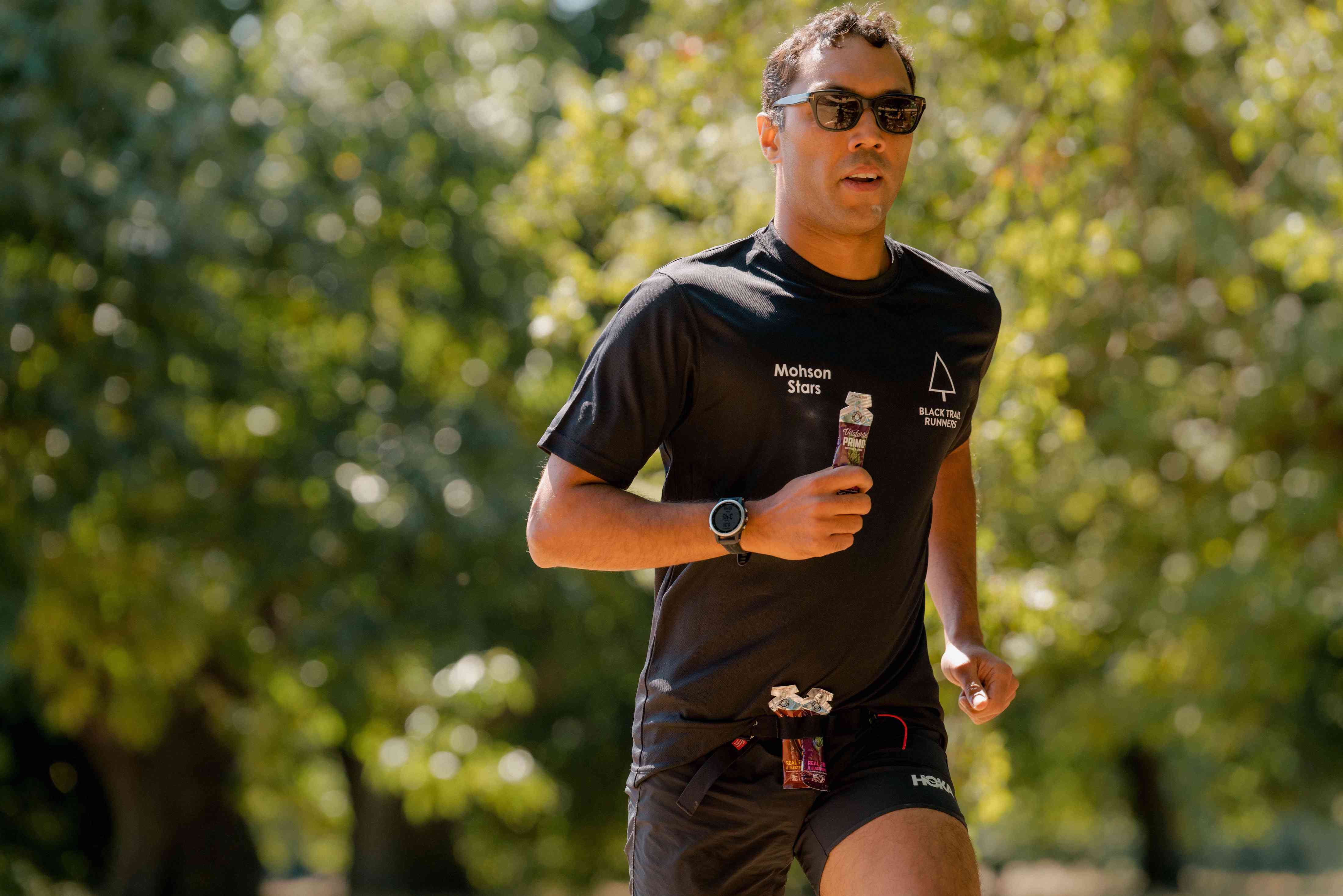

Featured
What Is Good Time For Half Marathon
Modified: August 19, 2023
Discover the perfect time to run a half marathon. Gain insights on the best training schedule, tips, and strategies for completing this featured race.
Introduction
Welcome to the world of half marathons! If you are a running enthusiast looking to challenge yourself and take your running game to the next level, a half marathon is the perfect race for you. A half marathon, as the name suggests, is a race that covers a distance of 13.1 miles or 21.1 kilometers. It is an exhilarating experience that requires dedication, persistence, and proper preparation.
Participating in a half marathon can be both physical and mental. It tests your endurance, stamina, and mental fortitude. Training for a half marathon involves a structured plan that gradually increases your running distance to help you build the necessary strength and endurance. Alongside the physical aspect, nutrition, hydration, and mental preparation play crucial roles in ensuring a successful race.
In this article, we will explore the key factors to consider when preparing for a half marathon. From creating a training schedule to understanding the importance of nutrition and developing race day strategies, we will guide you through the process of becoming a half marathon runner. By the end of this article, you will have a comprehensive understanding of what it takes to complete a half marathon and achieve your running goals.
So, whether you are a seasoned runner looking to challenge yourself or a beginner embarking on your running journey, this article is here to equip you with the knowledge and strategies to tackle a half marathon with confidence. So, let’s lace up our running shoes and dive into the world of half marathons!
What Is a Half Marathon?
A half marathon is a long-distance running race that covers a distance of 13.1 miles or 21.1 kilometers. It is a popular choice for runners as it offers a challenging yet achievable goal. The half marathon distance falls between a 10K race (6.2 miles) and a full marathon (26.2 miles), making it a great stepping stone for those looking to progress from shorter races to longer ones.
Half marathons are held in various locations, ranging from city streets to scenic trails, and attract a diverse group of participants, including recreational runners, seasoned athletes, and even first-time racers. The race usually starts early in the morning, with runners lining up at the starting line filled with anticipation and excitement.
One of the unique aspects of half marathons is the sense of camaraderie among participants. Runners often encourage and support each other along the course, creating a positive and motivational atmosphere. The cheering spectators lining the streets also contribute to the energy and spirit of the race.
Completing a half marathon is an accomplishment that requires both physical and mental preparation. It’s important to have a training plan that gradually increases your mileage and incorporates rest days for recovery. This allows your body to adapt and build the necessary endurance to complete the distance.
Additionally, pacing plays a crucial role in a successful half marathon. Finding the right balance between pushing yourself and conserving energy is key to maintaining a steady pace throughout the race. Many runners aim to finish within a specific time, while others focus more on simply completing the distance. Whatever your goal may be, the half marathon offers a personal challenge that pushes you to your limits.
Overall, a half marathon is a test of endurance, perseverance, and mental strength. It is a journey that offers a sense of accomplishment and a feeling of pride. Whether you are a seasoned runner or a beginner, participating in a half marathon is an experience that will leave a lasting impression and inspire you to continue pushing yourself as a runner.
Factors to Consider
Preparing for a half marathon requires more than just lacing up your running shoes and hitting the pavement. There are several important factors to consider that can greatly impact your performance and overall experience. Let’s delve into these key factors:
- Current Fitness Level: Before embarking on half marathon training, it’s essential to assess your current fitness level. This will help you determine the appropriate starting point and guide your training plan. If you are new to running or have been inactive for a while, it’s important to gradually build up your endurance and strength.
- Time Commitment: Training for a half marathon requires a significant time commitment. You will need to carve out time for regular runs, cross-training, and recovery. Consider your daily schedule and ensure you have enough time to dedicate to training without sacrificing other commitments.
- Training Plan: Having a structured training plan is key to safely and effectively preparing for a half marathon. This plan should include a progression of mileage and incorporate rest days for recovery. It’s also beneficial to incorporate cross-training activities, such as strength training and yoga, to enhance your overall fitness.
- Injury Prevention: Running long distances puts stress on your body, making injury prevention crucial. Gradually increasing your mileage, incorporating strength training, stretching, and cross-training, and listening to your body are all essential for minimizing the risk of injuries.
- Nutrition and Hydration: Proper nutrition and hydration play a vital role in your performance and recovery. Fueling your body with the right balance of carbohydrates, proteins, and fats is important for energy and endurance. Stay hydrated throughout your training and on race day to optimize your performance.
- Mental Preparation: Running a half marathon requires mental fortitude. You will encounter challenges and moments of fatigue during the race. Developing strategies to stay focused, motivated, and confident can make a significant difference in your performance.
- Race Day Strategies: Having a race day plan is crucial for a successful half marathon. This includes factors like pacing, fueling during the race, and knowing when to push yourself and when to conserve energy. Familiarize yourself with the race course and mentally prepare for any challenging sections.
By considering these factors and incorporating them into your training and preparation, you will be setting yourself up for a fulfilling and successful half marathon experience. Remember, every runner is unique, so tailor your approach to suit your individual needs and goals. Embrace the journey and enjoy each step towards crossing that finish line!
Training Schedule
A well-structured training schedule is the foundation of a successful half marathon journey. It provides a roadmap to gradually increase your mileage, improve your endurance, and prepare your body for the demands of the race. Here are some key considerations when creating your training schedule:
- Starting Point: Assess your current fitness level and determine your starting point. If you are new to running or have been inactive for a while, it’s important to begin with a plan that eases your body into the training process. This may involve a combination of walking and running intervals to gradually build your endurance.
- Build Mileage Gradually: Gradually increasing your mileage is essential to avoid injury and allow your body to adapt to the demands of longer distances. Begin with shorter runs and gradually add more miles each week. Aim for a mix of easy-paced runs, long runs, and a weekly rest day to allow your body to recover and rebuild.
- Include Variety: Incorporate different types of runs into your schedule to enhance your overall fitness and improve your performance. This may include speed workouts, tempo runs, hill training, and cross-training activities such as cycling or swimming. Variety not only keeps your training interesting but also helps develop different aspects of your running ability.
- Balance Rest and Recovery: Rest days are just as important as training days. Plan for at least one or two rest days each week to allow your body to recover and repair. Use these days to focus on active recovery, such as stretching, foam rolling, or engaging in low-impact activities like yoga or walking.
- Tapering: As race day approaches, it’s important to incorporate a tapering period into your training schedule. This involves gradually reducing your mileage and intensity in the weeks leading up to the race. Tapering allows your body to recover fully and ensures that you are well-rested and ready for the big day.
- Listen to Your Body: Pay attention to how your body feels throughout your training. If you experience excessive fatigue, pain, or discomfort, it’s important to listen to your body and make adjustments to your training schedule as needed. Rest or seek medical advice if necessary to avoid worsening injuries.
Remember, every runner is unique, so customize your training schedule to fit your individual needs and capabilities. It’s essential to find a balance between pushing yourself and allowing enough time for rest and recovery. Gradually build your mileage, listen to your body, and adjust your schedule as needed to ensure a safe and effective training experience.
Nutrition and Hydration
Nutrition and hydration play a vital role in maximizing your performance during training and on race day. Proper fueling and hydration strategies will help you maintain energy levels, optimize recovery, and ensure a successful half marathon experience. Here are some key considerations for your nutrition and hydration plan:
- Eat a Balanced Diet: Focus on consuming a balanced diet that includes a variety of fruits, vegetables, whole grains, lean proteins, and healthy fats. This will provide the necessary nutrients to support your training and overall health.
- Carbohydrate Loading: As your race day approaches, consider increasing your intake of carbohydrates to fuel your muscles properly. Include foods such as whole grains, pasta, potatoes, and fruits in your meals leading up to the race.
- Timing of Pre-Race Meal: Plan your pre-race meal at least two to three hours before the start time to allow for proper digestion. Focus on consuming complex carbohydrates for sustained energy and a moderate amount of protein for muscle repair.
- Fuel During Long Runs: During your long training runs, it’s essential to practice fueling and hydration strategies to determine what works best for you. Experiment with energy gels, sports drinks, or real food options that provide a mix of carbohydrates and electrolytes.
- Hydration: Staying hydrated is crucial for optimal performance. Drink water throughout the day and consider consuming an isotonic sports drink during your long runs to replenish electrolytes. On race day, be sure to hydrate adequately, but avoid overdrinking to prevent potential stomach discomfort.
- Recovery Nutrition: After a run, prioritize replenishing your body with a combination of carbohydrates and protein to aid muscle recovery. Include foods such as lean meats, dairy, nuts, and seeds to support proper recovery and repair.
- Supplements: While it’s ideal to obtain nutrients from whole foods, certain supplements can be beneficial. Speak with a healthcare professional to determine if you have any specific nutrient deficiencies and if supplements such as iron, Vitamin D, or omega-3 fatty acids would be beneficial.
Remember, everyone’s nutritional needs may vary, so it’s important to experiment and find what works best for you. Listen to your body and make adjustments accordingly. Proper nutrition and hydration will not only enhance your performance but also support your overall health and well-being as you train for your half marathon.
Mental Preparation
Mental preparation is a critical aspect of half marathon training and race day success. Running a half marathon requires not only physical strength but also mental fortitude to overcome challenges and push through fatigue. Here are some key strategies to help you develop mental resilience for your race:
- Set Realistic Goals: Define your goals for the half marathon and ensure they are realistic and attainable. Whether it’s finishing within a certain time or simply completing the race, having a clear goal will give you something to strive for during your training and on race day.
- Positive Self-Talk: Use positive affirmations and self-talk to maintain a positive mindset. Replace negative thoughts with encouraging and motivating thoughts. Remind yourself of your training, your strength, and your ability to conquer any challenges that come your way.
- Visualize Success: Spend some time visualizing yourself crossing the finish line, feeling strong and accomplished. Visualizing success can help boost your confidence and strengthen your belief in your abilities. The mind is a powerful tool, and visualizing can make a significant difference in your performance.
- Practice Mindfulness: Incorporate mindfulness techniques into your training routine to stay present and focused. Pay attention to your breath, body sensations, and the environment around you during your runs. Mindfulness can help reduce anxiety, improve concentration, and enhance overall mental clarity.
- Break the Race Down: Rather than focusing on the entire 13.1 miles, break the race down into smaller, manageable sections. Set mini-goals for each mile or kilometer, and celebrate each milestone as you progress through the race. This approach will make the distance feel more achievable and less overwhelming.
- Develop a Mantra: Create a personal mantra that resonates with you and helps you stay focused and motivated during challenging moments. It could be a simple phrase like “I am strong” or “I can do this.” Repeat your mantra to yourself when you feel your energy waning or doubt creeping in.
- Embrace Positivity: Surround yourself with positive and supportive people who uplift and encourage you. Share your journey with friends, family, or fellow runners, and draw strength from their support. Engaging in positive conversations and seeking inspiration from others can have a powerful impact on your mindset.
Remember, running a half marathon is a mental and physical journey. Your mindset and mental resilience will play a significant role in your overall experience and performance. By incorporating these mental preparation strategies into your training, you will be well-equipped to face any challenges that come your way and achieve your goals on race day.
Race Day Strategies
Race day is the culmination of weeks or months of training and preparation. Having a well-thought-out race day strategy will help you navigate through the half marathon with confidence and optimize your performance. Consider the following strategies for a successful race:
- Arrive Early: Plan to arrive at the race venue early to allow ample time for parking, bib pickup, and warm-up. This will help you avoid unnecessary stress and ensure that you are mentally and physically prepared for the race ahead.
- Warm-up: Prior to the start of the race, perform a dynamic warm-up routine to activate your muscles and increase your heart rate. This can include light jogging, dynamic stretches, and strides to prepare your body for the effort ahead.
- Stick to Your Pace: It’s easy to get caught up in the excitement of the race and start too fast. Stick to your planned pace and avoid going out too hard in the beginning. Pace yourself and find a comfortable rhythm that you can maintain throughout the race.
- Hydration and Fueling: Take advantage of the aid stations along the course to hydrate and refuel. Practice your fueling strategy during training to determine what works best for you. If you plan on using energy gels or sports drinks, carry them with you or familiarize yourself with the placement of aid stations along the course.
- Break the Race into Segments: Mentally divide the race into smaller segments or landmarks to stay focused and motivated. Instead of fixating on the distance remaining, focus on reaching the next mile marker or water station. Celebrate each milestone as you progress through the race.
- Mind Over Matter: As fatigue sets in, stay mentally strong and remind yourself of your preparation and training. Embrace positive self-talk and use your mental strategies to override negative thoughts and fatigue. Visualize yourself crossing the finish line strong and confident.
- Take Advantage of Support: Draw support and motivation from the spectators along the course. Their cheers and encouragement can provide a significant boost to your morale. If you have friends or family spectating, plan to see them at a particular point on the course for an additional motivational boost.
- Finish Strong: As you approach the final stretch, summon your remaining energy and give it your all. Dig deep and push yourself to finish strong. Visualize your training and the effort you’ve put into preparing for this moment as you sprint towards the finish line.
Every race is unique, and it’s important to be adaptable and adjust your race day strategy based on factors such as weather conditions and how you feel during the race. Remember to enjoy the experience and celebrate your achievements as you cross the finish line of your half marathon.
Conclusion
Congratulations! By reaching the end of this article, you have gained valuable insights into what it takes to prepare for and successfully complete a half marathon. We have explored the definition of a half marathon, the factors to consider, the importance of training, nutrition and hydration, mental preparation, and race day strategies.
Preparing for a half marathon requires dedication, commitment, and perseverance. It’s a physical and mental journey that challenges you in numerous ways. However, with the right training plan, proper nutrition, mental resilience, and race day strategies, you can conquer this distance and achieve your personal goals.
Remember to start with an assessment of your current fitness level and build your training plan gradually to prevent injuries. Pay attention to your nutrition and hydration, fueling your body with the right balance of nutrients for optimal performance. Embrace the importance of mental preparation, developing strategies such as positive self-talk and visualization to keep you motivated and focused.
On race day, stick to your pace, break the race down into manageable segments, and draw motivation from the support of spectators and fellow runners. Finish strong and celebrate your accomplishments as you cross the finish line.
Most importantly, enjoy the journey. Training for and running a half marathon is an incredible experience that pushes you to new limits and allows you to discover the strength within you. Cherish the memories you create, the friendships you make, and the satisfaction of achieving your goals.
So, lace up your running shoes, create your training plan, and embark on this exciting adventure. With determination, dedication, and the knowledge gained from this article, you are well on your way to conquering the half marathon distance. Good luck!









